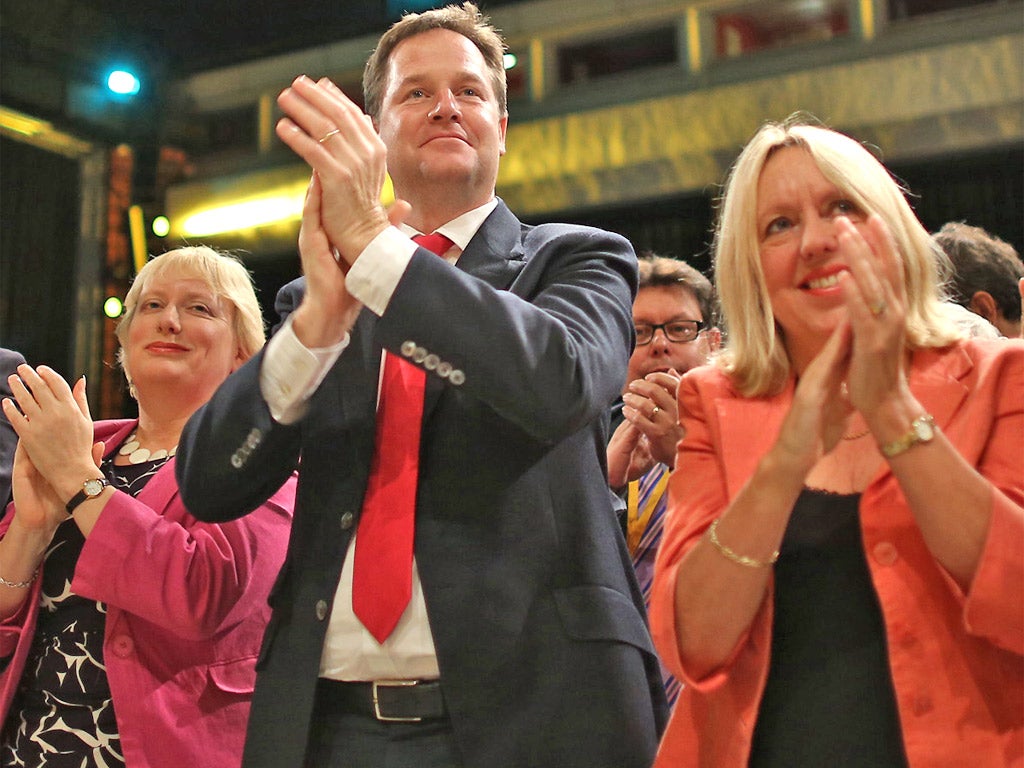Nick Clegg's conference speech: 'Tax Wealth, Not Work' should have been the slogan
Property makes people rich through good fortune, not effort. A tax on wealth - not work - is a policy the Lib Dems should be championing

Your support helps us to tell the story
From reproductive rights to climate change to Big Tech, The Independent is on the ground when the story is developing. Whether it's investigating the financials of Elon Musk's pro-Trump PAC or producing our latest documentary, 'The A Word', which shines a light on the American women fighting for reproductive rights, we know how important it is to parse out the facts from the messaging.
At such a critical moment in US history, we need reporters on the ground. Your donation allows us to keep sending journalists to speak to both sides of the story.
The Independent is trusted by Americans across the entire political spectrum. And unlike many other quality news outlets, we choose not to lock Americans out of our reporting and analysis with paywalls. We believe quality journalism should be available to everyone, paid for by those who can afford it.
Your support makes all the difference.One of the hardest jobs in politics is coming up with a decent slogan. I say this not with any particular experience of party politics, but rather a weary familiarity with the slogans of yore which fail to inspire. Remember "Back to Basics", for instance? Or "Vote Blue, Go Green?". Utter tripe, both. And what of Labour's corking re-election gambit in 2001, "A lot done, a lot still to do?". That sounded like something Alan Partridge would say at Glastonbury.
And though the competition is fierce, I think the offering plastered on lecterns at the Lib Dem conference this year - "Fairer tax in tough times" - is up there with the best of them. It's the sort of phrase - plodding, witless, earnest - that you might associate with a retired travelling salesman, or a Jehovah's Witness who can't take a hint. More's the pity, because the basic message, being a plea for social justice, is unimpeachable; and so, in the interests of our comrades in Brighton, let me dare to venture an alternative.
It's not quite "Change you can believe in", and it doesn't have the metaphorical allure of Ronald Reagan's seminal "Morning in Britain". But it does make sense and have the virtue of being both simple and something all three parties and the public would support. Plus it's alliterative, which is always good.
TAX WEALTH NOT WORK. There I said it.
I've banged on about it here before. Tax is a terrible and terribly necessary thing. It should be designed so that, as much as possible, it rewards socially desirable behaviour and disincentivises socially undesirable behaviour. Two things in the former category are: people going to work (especially very poor people, who might otherwise be welfare recipients); and entrepreneurs taking risks to start companies that create jobs. Two things in the latter category are: property bubbles (a chief cause of our economic woe); and old and rich people acquiring, through inflation in property and land value, wealth much faster than the young and poor.
TAX WEALTH NOT WORK.
Herbert Asquith laid out the case marvellously in 1907, and David Lloyd George incorporated it into his People's Budget of 1909: unlike income, property is visible and thereby hard to evade. The total value of land in Britain has been estimated at £50trn; tax that at one per cent and you get £500bn. Nice. If proper taxes on property and land - which make people rich not through effort and industry but good fortune and windfall gains derived from public infrastructure - were combined with radical tax cuts to income tax for all earners, and corporation tax for small businesses, even pleb-hating Tories ought to get behind it.
TAX WEALTH NOT WORK.
Morally and economically necessary, as well as right; capable of generating huge public support; consistent with the crowded centre of British politics; and alliterative to boot. What's not to like?
Join our commenting forum
Join thought-provoking conversations, follow other Independent readers and see their replies
Comments